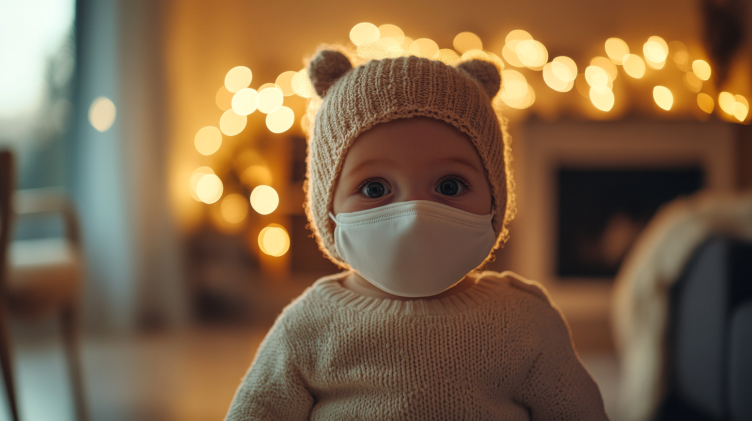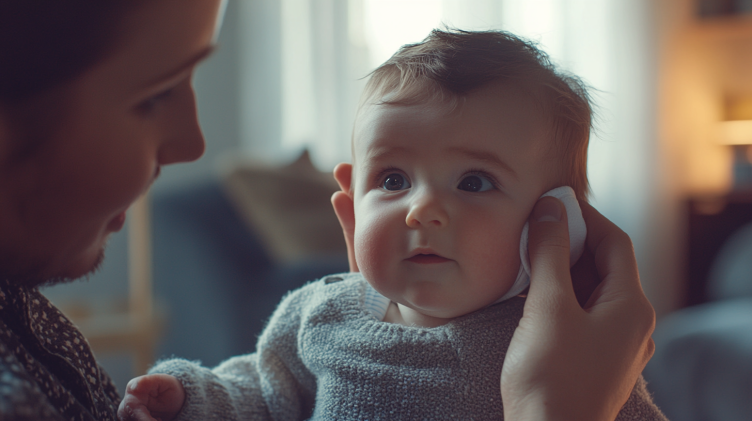We often hear people say, “Flu season is here; be careful with your baby!” But you might have questions: What exactly is the flu? How is it different from a common cold? And what special precautions do you need to take for your baby during flu season? Don’t worry, we’ve got you covered!
1. What is the Flu?
Influenza may sound like a complicated medical term, but in reality, it’s simply a more severe version of the common cold. It’s caused by the influenza virus, which can lead to a range of uncomfortable symptoms. The flu is highly contagious and spreads easily through the air when someone coughs, sneezes, or is in close contact with others. Babies are more vulnerable to the flu due to their still-developing immune systems. The flu season typically peaks in winter and spring, especially when temperatures fluctuate.

2. Flu vs. Common Cold: What’s the Difference?
Many parents are familiar with the common cold, with its mild symptoms like a runny nose and occasional sneezing. But the flu is much more intense, with symptoms that are stronger and last longer. Here’s a breakdown of the key differences:
Symptoms Comparison:
- Common Cold: Symptoms are mild, typically including a runny nose, sore throat, mild cough, and occasional low fever. Babies may feel a little uncomfortable but usually maintain their appetite and daily routine.
- Flu: Symptoms are more severe, including high fever (above 38.5°C), fatigue, loss of appetite, and intense coughing. In some cases, your baby may feel so sick that they don’t want to get out of bed.

Contagion:
- Common Cold: Though contagious, the cold is less transmissible and usually resolves quickly.
- Flu: The flu spreads faster, with the virus lingering in the air for a longer time, especially in closed spaces. If one person in the household has the flu, other children are at risk.
Recovery Time:
- Common Cold: Recovery is typically quick, with symptoms easing within a few days.
- Flu: Recovery takes longer, usually 1-2 weeks. Babies with weaker immune systems may experience complications, such as pneumonia or ear infections, extending recovery time.

3. Special Considerations for Babies During Flu Season
The flu poses specific risks to babies, as their immune systems are still developing, making them more susceptible to viral infections. Here are some important points to consider during flu season:
- Babies under six months, especially newborns, may experience more severe symptoms if they contract the flu.
- It’s essential to limit your baby’s exposure to germs, particularly during flu season. If someone in the household is sick, avoid close contact with your baby, wear a mask when outside, and maintain good hand hygiene.
- Flu complications, such as pneumonia or ear infections, can put additional stress on your baby’s body, so it’s crucial to monitor symptoms closely.
- If your baby has a high fever, persistent crying, or difficulty breathing, seek medical attention immediately. Avoid giving adult medications to your baby without consulting a doctor.

4. Impact on Sleep and Appetite
The flu can affect your baby’s sleep and appetite. Fever, sore throats, and congestion may prevent your baby from sleeping well, which can slow their recovery. In addition, a loss of appetite is common during the flu, as babies may refuse to eat due to discomfort. Make sure to offer light, nutritious meals rich in vitamins and protein to boost immunity. A peaceful, quiet sleep environment will also help your baby rest and recover.

5. How to Protect Your Baby During Flu Season
Prevention is the best defense! Here are some steps you can take to protect your baby from the flu:
- Ensure that everyone in the household practices good hygiene, including frequent handwashing.
- Avoid crowded places and close contact with people who are sick.
- Ensure that your baby receives their flu vaccination if they are old enough.
- Create a comfortable, quiet space for your baby to sleep and recover.

Conclusion: Staying Vigilant During Flu Season
Flu season is not something to take lightly, especially when it comes to protecting your baby. By staying vigilant and following these precautionary measures, you can minimize the risks. In upcoming articles, we will explore various aspects of baby care during flu season, including tips on diet, sleep, and everyday protection.



















